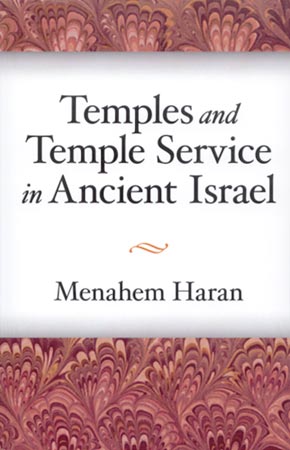
Temples and Temple-Service in Ancient Israel
An Inquiry into Biblical Cult Phenomena and the Historical Setting of the Priestly School
Menahem Haran
Temples and Temple-Service in Ancient Israel
An Inquiry into Biblical Cult Phenomena and the Historical Setting of the Priestly School
Menahem Haran
This milestone study is a thorough examination of the various cultic and social phenomena connected with the temple—activities connected with the temple’s inner sphere and belonging to the priestly circle. The book also seeks to demonstrate the antiquity and the historical timing of the literary crystallization of the priestly material found in the Pentateuch. Contents: Prologue, The Israelite Temples, Temples and Open Sacred Places, The Priesthood and the Tribe of Levi, The Aaronites and the Rest of the Levitical Tribe, The Distribution of the Levitical Tribe, The Centralizations of the Cult, The Priestly Image of the Tabernacle, Grades of Sanctity in the Tabernacle, Temple and Tabernacle, The Ritual Complex Performed Inside the Temple, Incense of the Court and of the Temple Interior, The Symbols of the Inner Sanctum, The Non-Priestly Image of the Tent of Mo’ed, The Emptying of the Inner Sanctum, Pilgrim-Feasts and Family Festivals, and The Passover Sacrifice.
- Description
- Table of Contents
List of Maps and Figures
Abbreviations
I. PROLOGUE
II. THE ISRAELITE TEMPES
Temples and Altars
The High-Places
The Distribution of the Israelite Temples
III. TEMPLES AND OPEN SACRED PLACES
The Temples of Jerusalem and Later Temples
The Cultic Open Areas
IV. THE PRIESTHOOD AND THE TRIBE OF LEVI
The Prerogative of Priesthood and the Levitical Status
The Viewpoint of J and E
The Historical Aspect
The Levitical Priests in Historical Reality
V. THE AARONITES AND THE REST OF THE LEVITICAL TRIBE
The Aaronic Group—its Range and Position
The Non-Priestly Levites in Pre Exilic Times
The Jerusalemite Priesthood and the House of Aaron
The Levites of Ezekiel’s Code and in Post-Exilic Times
VI. THE DISTRIBUTION OF THE LEVITICAL TRIBE
The Critical Views
The Distinguishing Features of the Levitical Cities
Between Utopia and Historical Reality
Conclusions
VII. THE CENTRALIZATIONS OF THE CULT
The Distinguishing Features of the Two Reforms
The Ideological Background of Hezekiah’s Reform
The Time-Span of the Priestly School
VIII. THE PRIESTLY IMAGE OF THE TABERNACLE
The Form
The Material Gradation
The Priestly Vestments
IX. GRADES OF SANCTITY IN THE TABERNACLE
The Prohibitions of Touch and Sight
The Prohibition of Approach and the Court Area
The Lethal Aura Surrounding the Holiness
X. TEMPLE AND TABERNACLE
Projections of the Temple
The Priestly Tradition and the Uniqueness of the Tabernacle
The Object of the Temple Legend
XI. THE RITUAL COMPLEX PERFORMED INSIDE THE TEMPLE
The Cultic Gradation and the Ritual of Tamid
Rites Performed within the Temple
The Unity of the Complex of Inner Rites
The Pre-Biblical Origins
Further Corollaries
XII. INCENSE OF THE COURT AND OF THE TEMPLE INTERIOR
The Censer Incense and the Antiquity of its Cultic Use
The Altar Incense
XIII. THE SYMBOLS OF THE INNER SANCTUM
The Two Symbols
The Symbol of the Throne
The Footstool and the Variations in the Form of the Cherubim
XIV. THE NON-PRIESTLY IMAGE OF THE TENT OF MO’ED
The Distinguished Features of ‘Ohel Mo’ed
The Tent of Mo’ed and the Temple
XV. THE EMPTYING OF THE INNER SANCTUM
The Acts of Manasseh and their Impact
Vessels of the Sanctums and of the Temple Treasuries
XVI. PILGRIM-FEASTS AND FAMILY FESTIVALS
The Three Pilgrim-Feasts
The Hag and the Exodus Stories
The Yearly Family Sacrifice
The Yearly Banquet and Other Family Feasts
XVII. THE PASSOVER SACRIFICE
Distinguishing Features and Supposed Origin
The Problem of the Passover’s Antiquity
The Ancient Injunctions Concerning the Passover
The Passover as a Temple Sacrifice
GLOSSARY OF BIBLICAL TERMS AND PHRASES
SUBJECT INDEX
INDEX OF BIBLICAL REFERENCES
Mailing List
Subscribe to our mailing list and be notified about new titles, journals and catalogs.



